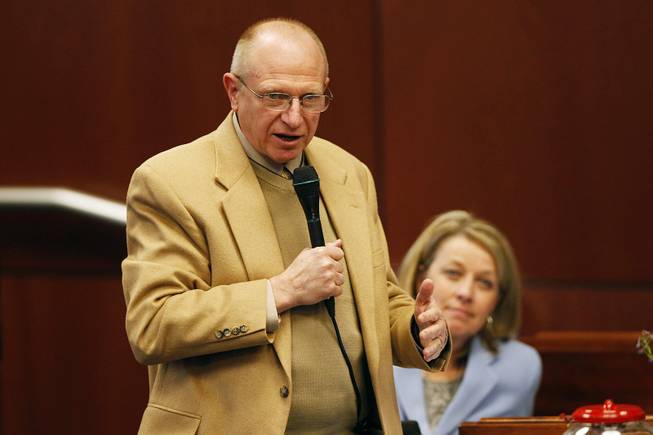
Sam Morris / Las Vegas Sun
Senator Joe Hardy informs his colleagues of the importance of getting a flu shot during a floor session Thursday, Feb. 7, 2013 during the 2013 legislative session in Carson City.
Wednesday, Feb. 20, 2013 | 2 a.m.
Sun coverage
A smoking habit could cost you a job opportunity at a hospital or other medical facility under legislation proposed by Sen. Joe Hardy, R-Boulder City.
It’s currently illegal for an employer to discriminate against employees who use a product — such as tobacco — outside of work that does not affect job performance or the safety of other employees. Hardy’s measure, Senate Bill 87, would repeal that law.
“It would appear that this would allow an employer to not hire an employee who smokes or drinks,” the Nevada Taxpayer’s Association said in a recent newsletter.
At a legislative hearing Wednesday, Hardy plans to introduce an amendment that would allow hospitals, nursing homes, hospice, home health and other medical facilities to specifically factor someone’s smoking habit into hiring decisions made after June 30.
Under the amendment, other employers would remain prohibited from basing decisions on an employee’s smoking habit.
“The theory is that when you’re in the hospital, you don’t want someone next to you who is smoking while you’re sick,” said Hardy, who is one of two physicians in the Legislature. (The other is Assemblyman Andy Eisen.) “Patients who smell smoke many times have problems with the reaction to it.”
Renown Health, a Nevada-based health care company, is working with Hardy on the bill. The company wants to factor smoking into its future hiring decisions but does not want any current employee to be fired for smoking, said Fred Hillerby, lobbyist for Renown.
“We just want to be able, if we choose, to not hire smokers,” he said. “We think it’s better for the health of our employees and our patients.”
Smoking cigarettes at home or outside during a break may be the personal choice of an employee, but being exposed to the lingering odor of cigarette smoke clinging to a medical employee’s clothing is not a choice for the sick and injured.
“It is their personal decision,” Hardy said. “It’s also a personal decision to quit smoking or risk some adverse employment activity.”
The comfort of the patient may be a noble idea, but it’s also now tied to payments hospitals receive from the federal government.
Under the Affordable Care Act, how patients score a hospital on such measurements as communication with nurses and doctors, cleanliness and quietness of the hospital environment factor into federal reimbursements paid to hospitals.
Hillerby, however, said “that was not the reason we started down this path.”

Join the Discussion:
Check this out for a full explanation of our conversion to the LiveFyre commenting system and instructions on how to sign up for an account.
Full comments policy